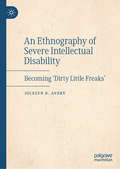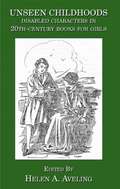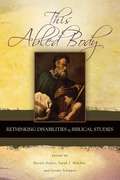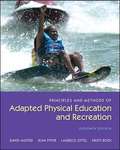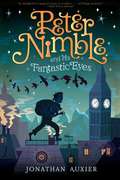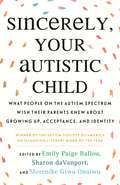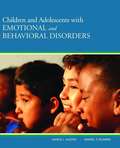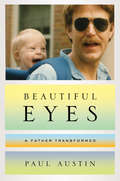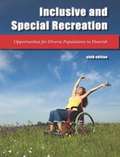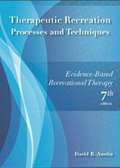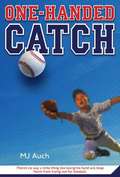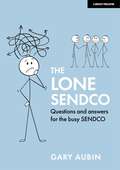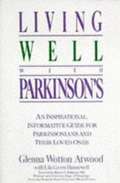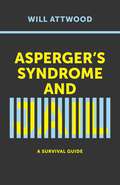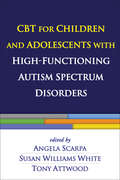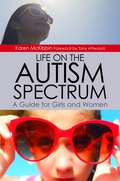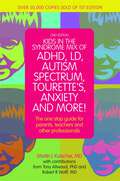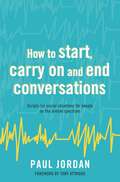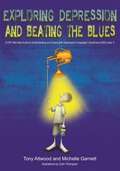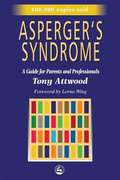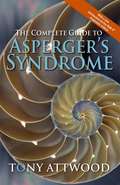- Table View
- List View
Prairie School (I Can Read Series)
by AviIt's the 1880s, Noah works hard on the family farm and roams free on the Colorado prairie. One day his Aunt Dora arrives to give him some schooling. Noah doesn't think he needs it. What use is reading on the prairie? But what Noah discovers will change his life forever.
An Ethnography of Severe Intellectual Disability: Becoming 'Dirty Little Freaks'
by Jocelyn D. AveryIn this ethnographic investigation of a special education needs college in Australia, Jocelyn D. Avery explores how the self-identity of people with severe intellectual identities is influenced by carers and support people in their lives. Employing theoretical foundations of self-identity and embodiment and drawing largely on Mary Douglas’s (1996) notions of ritual and hygiene, purity and danger, Avery argues that students in this environment are treated as though they exist in a vacuum, rather than a highly complex social environment: strategies to ‘contain’ their difficult selves ultimately lead to continued confinement, as if the students themselves were ‘contaminated’. In the midst of this much-needed ethnography, Avery meditates on her own role: matters of consent, communication, and cooperation pose a challenge to anthropological engagement with severe intellectual disability, but researcher ethics and positionality have their own difficulties. The reflection provided here will provide a guide for future researchers to sensitively engage with people with disability.
It's $5 Extra for Cerebral Palsy
by Anthony M. Aversano Marie A. LacerraMarie A. Lacerra was born with severe Cerebral Palsy before the days of "accessibility," "normalization," and laws protecting the rights of people with disabilities. However, despite a world which was not ready for her, Marie was blessed with family and friends who were ahead of their time and not afraid to show the world who Marie was. Finally released from the prison of unintelligible speech by modern technology, Marie is now able to tell her stories --stories much like the ones we tell everyday: filled with love and laughter, tears and loss, hope and courage. With the help of a special "word hunting" computer, and a deep desire to communicate, her inspirational stories reveal the power of the human spirit and paint a vivid picture of the prejudice and difficulties a person with Cerebral Palsy must face.
Unseen Childhoods: Disabled Characters in 20th-Century Books for Girls
by Helen A. AvelingThe nine essays in this collection break the 20th century into three periods - early, middle, and late. They cover the themes of stereotypes, role models, and inclusion and segregation, tracing their evolution across nearly a hundred years. Among the essays are "Modeling Illness in the Early 20th Century" by Helen A. Aveling; "A Choice of Virtues," by Deborah Kent; and "My Sibling the Other," by Rebecca R. Butler.
This Abled Body: Rethinking Disabilities in Biblical Studies
by Hector Avalos Sarah Melcher Jeremy SchipperContributors from biblical studies and from the nascent discipline of disability studies draw on recent articulations of critical disability theory to interrogate the use of disability as a conceptual category in biblical and other Near Eastern texts, and in scholarly interpretations of these texts. Among the perspectives they offer are: deformity and disability in Greece and Rome, the normate hermeneutic and interpretations of disability within the Yahwistic narratives, and disability and redemption in biblical literature.
Principles and Methods of Adapted Physical Education and Recreation (11th Edition)
by David Auxter Carol Huettig Jean Pyfer Kristian Roth Lauriece L. ZittelProvides physical educators with up-to-date knowledge and skills to deal with all levels of students' abilities. It is the only text in the adapted physical education market that provides both task-specific and developmental teaching approaches. With the national movement to include most students with disabilities into the general curriculum, the text is designed to enable adapted and regular physical education teachers to successfully address those students' needs in the regular physical education class.
Peter Nimble and His Fantastic Eyes
by Jonathan AuxierRaised to be a thief, blind orphan Peter Nimble, age ten, steals from a mysterious stranger three pairs of magical eyes that lead him to a hidden island where he must decide to become a hero or resume his life of crime.
Sincerely, Your Autistic Child: What People on the Autism Spectrum Wish Their Parents Knew About Growing Up, Acceptance, and Identity
by Autistic Women and Nonbinary NetworkA rare and diverse collection of autistic voices that highlights to parents the unique needs of girls and nonbinary people who are growing up with autism.Most resources available for parents come out of the medical model of disability--from psychologists, educators, parents, and doctors--offering parents a narrow and technical approach to autism. Furthermore, it is widely believed that many autistic girls and women are underdiagnosed, which has further limited the information available regarding the unique needs of girls and nonbinary people with autism. <p><p>Sincerely, Your Autistic Child represents an authentic resource for parents written by people who understand this experience most, autistic people themselves. From childhood and education to gender identity and sexuality, this anthology of autistic contributors tackles the everyday challenges of growing up while honestly addressing the emotional needs, sensitivity, and vibrancy of autistic girls and nonbinary people. Written like letters to parents, the contributors reflect on what they have learned while growing up with autism and how parents can avoid common mistakes and overcome challenges while raising their child. <p><p>Sincerely, Your Autistic Child calls parents to action by raising awareness and redefining "normal" in order to help parents make their child feel truly accepted, valued, and celebrated for who they are.
Children And Adolescents With Emotional And Behavioral Disorders
by Vance L. Austin Daniel T. SciarraThis first edition text is specifically designed to help teachers work successfully with children who exhibit emotional and behavioral disorders by affording readers a comprehensive and holistic repertoire of valuable, evidence-based treatment strategies. Written from the dual perspectives of an experienced clinician and a long-time educator, the school professionals and students who read it will better understand the role of both teacher and service provider, optimizing the coordination and effectiveness of the services that are critical to the success of these students.
Beautiful Eyes: A Father Transformed
by Paul AustinThrough parenting a child with a disability, a father discovers patience, acceptance, and unconditional love. In 1987, Paul Austin and his wife Sally were newlyweds, excited about their future together and happily anticipating the birth of their first child. He was a medical student and she was a nurse. Everything changed the moment the doctor rushed their infant daughter from the room just after her birth, knowing instantly that something was wrong. Sarah had almond-shaped eyes, a single crease across her palm instead of three, and low-set ears--all of which suggested that the baby had Down syndrome. Beginning on the day Sarah is born and ending when she is a young adult living in a group home, Beautiful Eyes is the story of a father's journey toward acceptance of a child who is different. In a voice that is unflinchingly honest and unerringly compassionate, Austin chronicles his life with his daughter: watching her learn to walk and talk and form her own opinions, making decisions about her future, and navigating cultural assumptions and prejudices--all the while confronting, with poignancy and moving candor, his own limitations as her father. It is Sarah herself, who, in her own coming of age and her own reconciling with her difference, teaches her father to understand her. Time and again, she surprises him: performing Lady Gaga's "Poker Face" at a talent show; explaining how the word "retarded" is hurtful; reacting to the events of her life with a mixture of love, pain, and humor; and insisting on her own humanity in a world that questions it. As Sarah begins to blossom into herself, her father learns to look past his daughter's disability and see her as the spirited, warmhearted, and uniquely wise person she is.
Inclusive and Special Recreation: Opportunities for Diverse Populations to Flourish
by David R. Austin Youngkhill LeeThis text emphasises the value of inclusive recreation opportunities for all people. It combines an optimistic approach with a strong conceptual foundation grounded in current research. Case studies of inclusive recreation programs in the United States and Canada are included, along with practical advice geared to helping recreation personnel design and implement programs that provide optimal inclusion for persons with disabilities.
Therapeutic Recreation Processes & Techniques: Evidenced-Based Recreational Therapy
by David R. AustinIn fact, the subtitle, "Evidence-Based Recreational Therapy", has been added to emphasise the importance of evidence-based practice in recreational therapy. Today recreational therapists must possess a broad knowledge base that offers them a foundation for practice. This book explores how to practice recreational therapy yet provides theoretical and empirical evidence to support practice.
One-Handed Catch
by Mary Jane AuchAfter losing his hand in an accident in his father's butcher shop in 1946, sixth-grader Norman uses hard work and humor to learn to live with his disability and to succeed at baseball, art, and other activities.
The Lone SENDCO: Questions and answers for the busy SENDCO
by Gary AubinThe SENDCO role can feel quite isolating. SENDCOs know more than anyone in their setting about SEND, so who do they go to when they need support? Especially when new to the role, who do you turn to when tackling a problem or looking for inspiration? The Lone SENDCO answers over 300 questions that SENDCOs grapple with, whether experienced or new: How should outcomes be worded? Do I get longer to respond if I receive a consultation in the holidays? How shall I structure my inclusion department? How do I assess SEND for a child with EAL? How should I be working with my school’s Careers Officer? How do I motivate disengaged learners? What do Ofsted look for in an inspection?Split helpfully into easily-workable sections, this reference book can be picked up and dipped into, whatever the priority. Whether it’s organising an annual review for the first time, taking your partnership with parents to the next level or linking your work in SEND to cognitive science, The Lone SENDCO tackles the questions you have and the answers you need.Sections include: EHCPs and annual reviews, working with parents/carers, statutory compliance and legislation, strategic thinking as a SENDCO, identification and assessment of SEND, supporting transition for pupils, working with pupils, Ofsted developing my knowledge as a SENDCO, funding for SEND, teaching and learning, exam access arrangements, understanding data, tracking progress, managing a SEND register, understanding the SENDCO role, challenging decisions around placement and provision, CPD as a SENDCO, SEND as a whole-school issue, working with TAs, working with external partners, provision mapping, interventions, troubleshooting and a guide to types of need.
The Lone SENDCO: Questions and answers for the busy SENDCO
by Gary AubinThe SENDCO role can feel quite isolating. SENDCOs know more than anyone in their setting about SEND, so who do they go to when they need support? Especially when new to the role, who do you turn to when tackling a problem or looking for inspiration? The Lone SENDCO answers over 300 questions that SENDCOs grapple with, whether experienced or new: How should outcomes be worded? Do I get longer to respond if I receive a consultation in the holidays? How shall I structure my inclusion department? How do I assess SEND for a child with EAL? How should I be working with my school’s Careers Officer? How do I motivate disengaged learners? What do Ofsted look for in an inspection?Split helpfully into easily-workable sections, this reference book can be picked up and dipped into, whatever the priority. Whether it’s organising an annual review for the first time, taking your partnership with parents to the next level or linking your work in SEND to cognitive science, The Lone SENDCO tackles the questions you have and the answers you need.Sections include: EHCPs and annual reviews, working with parents/carers, statutory compliance and legislation, strategic thinking as a SENDCO, identification and assessment of SEND, supporting transition for pupils, working with pupils, Ofsted developing my knowledge as a SENDCO, funding for SEND, teaching and learning, exam access arrangements, understanding data, tracking progress, managing a SEND register, understanding the SENDCO role, challenging decisions around placement and provision, CPD as a SENDCO, SEND as a whole-school issue, working with TAs, working with external partners, provision mapping, interventions, troubleshooting and a guide to types of need.
Living Well with Parkinson's
by Glenna Wotton Atwood Lila Green HunnewellPractical suggestions for everyday living, nutrition, exercise, attitude, dealing with doctors, medications, therapies, support grou Oneps, organizations in the US and Canada. One of the authors has Parkinson's and tells of her own experiences. No profanity or violence. No explicit sexual words.
Asperger’s Syndrome and Jail: A Survival Guide
by Will AttwoodWill Attwood was finishing a three-year sentence in prison when he was formally diagnosed with Asperger's syndrome for the first time. After his diagnosis he recognised just how much it had been affecting his life behind bars.This book is a practical advice guide for people with autism who have been sentenced to time in prison. Will shares his first-hand knowledge of what to expect and how to behave within the penal system. He sheds light on topics that are important for people with autism, answering questions such as: How should you act with inmates and guards? How do you avoid trouble? What about a prison's environmental stimuli may cause you anxiety?His thoughtful, measured writing debunks rumours about daily life in prison, and the useful tips and observations he offers will help anyone with autism prepare for the realities of spending time incarcerated, and be enormously helpful to those working with offenders on the autism spectrum.
CBT for Children and Adolescents with High-Functioning Autism Spectrum Disorders
by Tony Attwood Susan Williams White Angela ScarpaThis book helps clinicians harness the benefits of cognitive-behavioral therapy (CBT) for children and adolescents with high-functioning autism spectrum disorders (ASD). Leading treatment developers describe promising approaches for treating common challenges faced by young people with ASD--anxiety and behavior problems, social competence issues, and adolescent concerns around sexuality and intimacy. Chapters present session-by-session overviews of each intervention program, review its evidence base, and address practical considerations in treatment. The book also discusses general issues in adapting CBT for this population and provides a helpful framework for assessment and case conceptualization informed by DSM-5.
Life on the Autism Spectrum - A Guide for Girls and Women
by Tony Attwood Karen MckibbinWhy is Autism Spectrum Disorder so misunderstood in girls and women and why do so many go under the radar without the support that they need? This practical guide explains the unique issues that affect females with autism and provides tools and strategies that girls, women and their families can use in day-to-day life. Following the story of Alison, a girl diagnosed with Asperger Syndrome, through both childhood and adulthood, we get an inside view of the challenges that girls and women with autism face. Straightforward information and advice is provided on key topics including: · social skills and communication · how to overcome bullying · sensory issues and food sensitivity · the need for routine · perceptions of gender · and physiological changes. Essential reading for parents of daughters on the spectrum, as well as girls and women who carry the diagnosis themselves.
Kids in the Syndrome Mix of ADHD, LD, Autism Spectrum, Tourette's, Anxiety, and More!: The one-stop guide for parents, teachers, and other professionals
by Tony Attwood Martin L. KutscherThe completely updated and expanded new edition of this well-established text incorporates DSM-5 changes as well as other new developments. The all-in-one guide covers the whole range of often co-existing neuro-behavioral disorders in children - from attention deficit hyperactivity disorder (ADHD), obsessive-compulsive disorder, and anxiety, to autism spectrum disorders, nonverbal learning disabilities, Tourette's, sensory integration problems, and executive dysfunction. A completely revised chapter on the autism spectrum by Tony Attwood explains not only new understanding in the field, but the new diagnostic criteria, and the anticipated usage of the term 'Asperger's Syndrome'. Dr. Kutscher provides accessible information on causes, symptoms, interactions with other conditions, and treatments. He presents effective behavioral strategies for responding to children who display traits of these disorders - whether at home, at school, or in other settings - along with case vignettes and practical tips. Finally, a chapter on the role of medications summarizes current knowledge. The author's sympathetic yet upbeat approach and skillful explanations of the inner world of children in the syndrome mix make this an invaluable companion for parents, teachers, professionals, and anyone else who needs fast and to-the-point advice on children with special needs.
How to start, carry on and end conversations: Scripts for social situations for people on the autism spectrum
by Tony Attwood Paul JordanDo you find it hard to make friends? Do you struggle to know what to say to start a conversation? In this book, Paul Jordan, who is on the autism spectrum, explains how to make sense of everyday social situations you might encounter at school, university or in other group settings. He reveals how, with the use of just 65 simple words, it is possible to create 'scripts for thinking' that break conversations down into small chunks and help you to think of what to say, whether you are speaking to a fellow student, starting a conversation with a new friend, calling out bullies or answering a teacher's question. These small words will be a big help for all teenagers and young people with ASD.
Exploring Depression, and Beating the Blues: A CBT Self-Help Guide to Understanding and Coping with Depression in Asperger’s Syndrome [ASD-Level 1]
by Tony Attwood Michelle Garnett Colin ThompsonFor people with ASDs, depression is common, and has particular features and causes. This outstanding book provides a comprehensive review of these aspects, and an effective self-help guide for anyone with an autism spectrum disorder (ASD) affected by depression. Written by the leading experts in the field, the book explains and describes depression, the forms it can take, and how it looks and feels for a person on the autism spectrum. The authors draw on the latest thinking and research to suggest strategies for coping with the effects of depression and provide a complete step-by-step CBT self-help programme, designed specifically for individuals with ASDs. The programme helps increase self-awareness, including identifying personal triggers, and provides the tools to combat depression.
Asperger's Syndrome: A Guide for Parents and Professionals
by Tony AttwoodA book designed for parents and teachers alike on Asperger's Syndrome. The information in this book is also applicable to individuals who are labeled as high functioning Autism. An excelent resource for anyone who works with an individual with a disorder on the autism spectrum.
The Complete Guide to Asperger's Syndrome
by Tony AttwoodThe Complete Guide to Asperger's Syndrome is the definitive handbook for anyone affected by Asperger's syndrome (AS). Now including a new introduction explaining the impact of DSM-5 on the diagnosis and approach to AS, it brings together a wealth of information on all aspects of the syndrome for children through to adults. Drawing on case studies and personal accounts from Attwood's extensive clinical experience, and from his correspondence with individuals with AS, this book is both authoritative and extremely accessible. Chapters examine: * causes and indications of the syndrome * the diagnosis and its effect on the individual * theory of mind * the perception of emotions in self and others * social interaction, including friendships * long-term relationships * teasing, bullying and mental health issues * the effect of AS on language and cognitive abilities, sensory sensitivity, movement and co-ordination skills * career development. There is also an invaluable frequently asked questions chapter and a section listing useful resources for anyone wishing to find further information on a particular aspect of AS, as well as literature and educational tools. Essential reading for families and individuals affected by AS as well as teachers, professionals and employers coming in contact with people with AS, this book should be on the bookshelf of anyone who needs to know or is interested in this complex condition. 'I usually say to the child, "Congratulations, you have Asperger's syndrome", and explain that this means he or she is not mad, bad or defective, but has a different way of thinking.' - from The Complete Guide to Asperger's Syndrome
The Complete Guide to Asperger's Syndrome
by Tony AttwoodDefinitive guide presenting latest information from an expert in easy-to-read English.

